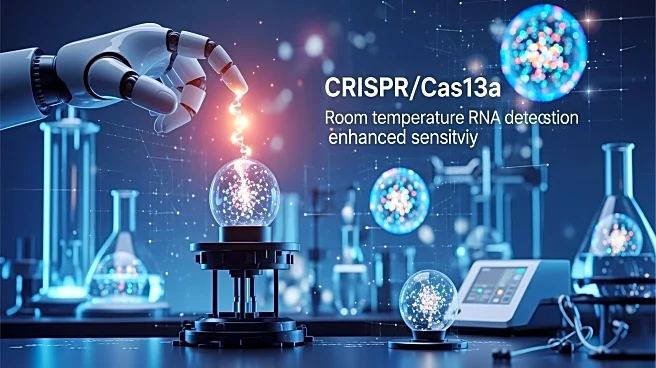What's Happening?
Recent advancements in CRISPR/Cas13a technology have led to the development of a novel RNA detection method known as the CARRD assay. This method utilizes a CRISPR anti-tag hairpin to enable room-temperature
RNA detection with high sensitivity and specificity. The assay leverages the collateral cleavage activity of Cas13a, which is activated upon binding to target RNA sequences. The presence of an anti-tag sequence inhibits this activation, allowing for controlled detection processes. The CARRD assay simplifies equipment requirements by operating effectively at room temperature, making it suitable for point-of-care diagnostic applications. This development marks a significant step forward in RNA detection technology, offering a more accessible and efficient method for viral diagnostics.
Why It's Important?
The introduction of the CARRD assay represents a major advancement in the field of molecular diagnostics, particularly for viral RNA detection. By enabling sensitive and specific RNA detection at room temperature, this technology reduces the need for complex laboratory equipment, making it more accessible for use in resource-limited settings. This could have significant implications for public health, as it allows for rapid and accurate detection of viral infections, potentially improving response times and treatment outcomes. The assay's ability to operate without amplification steps also streamlines the diagnostic process, reducing costs and increasing efficiency. As such, the CARRD assay could play a crucial role in enhancing global health surveillance and management.
What's Next?
The CARRD assay is poised for further development and optimization to expand its application range. Future research may focus on adapting the assay for different types of RNA targets, including those from various viruses and pathogens. Additionally, efforts to integrate this technology into portable diagnostic devices could further enhance its utility in field settings. Stakeholders in the healthcare and biotechnology sectors are likely to explore partnerships and collaborations to commercialize this technology, potentially leading to widespread adoption in clinical diagnostics. Regulatory approval processes will be a key focus as the assay moves towards practical implementation.
Beyond the Headlines
The development of the CARRD assay highlights the growing importance of CRISPR technology in the field of diagnostics. Beyond its immediate applications, this advancement may stimulate further research into CRISPR-based detection methods, potentially leading to breakthroughs in other areas such as environmental monitoring and agricultural pathogen detection. The ethical implications of CRISPR technology, particularly concerning privacy and data security in diagnostics, will need to be addressed as the technology becomes more prevalent. Long-term, the integration of CRISPR-based diagnostics into healthcare systems could transform disease management and prevention strategies.










